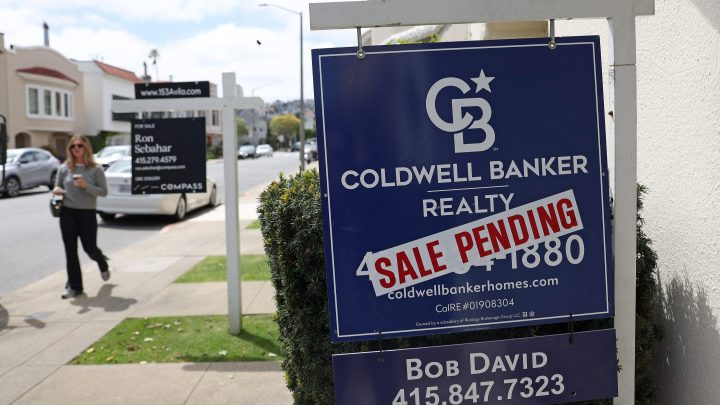
Is rising mortgage debt a bad sign for the economy?

Household debt rose 1.2% in the fourth quarter of last year, according to the New York Federal Reserve. A lot of that was thanks to new mortgages; in fact, the New York Fed says mortgage debt has grown 30% since before the pandemic.
But even though rising debt burdens can mean that the economy is getting more vulnerable, all that mortgage debt isn’t necessarily a bad sign.
Mortgage debt made up 70% of household debt last quarter, the New York Federal Reserve reports. That’s no surprise given that we’re talking about the biggest asset most households own, said Shannon Grein, an economist with Wells Fargo.
“So it’s really just the overall value associated with the purchase that causes mortgages to be a bigger debt burden for the household sector,” she said.
But even though that debt burden has been growing, Grein said she’s not all that concerned. For one, people’s incomes have been rising too.
“So when you take mortgage debt as a share of income, it’s still relatively manageable,” she said. “It suggests that households aren’t nearly as over-levered as they were going into the 2008 crisis.”
Plus, 80% of mortgage holders have a rate below 5% from back when rates were cheap, she said.
As a result? “The fact that most mortgages are locked in at low rates is having a stimulative effect on the economy,” said Grein.
That’s because not having to throw all your money toward a big mortgage payment means more money for literally anything else, noted Kathy Bostjancic, chief economist at Nationwide.
“That could clearly have played a role in boosting consumer spending, and also just making households feel better about their balance sheets overall,” she said.
Sure, that’s nice for anyone lucky enough to own a home. But Bostjancic explained that all that spending also means more business income — which, in turn, can mean more equipment purchases and more hiring.
“So what that does is keep the economy turbocharged, because consumers, overall, are spending — especially those lucky ones — spending more than they otherwise would be,” said Bostjancic.
The low mortgage rates people are sitting on have also helped people feel comfortable taking on other debt.
While delinquencies on credit card debt and auto loans have been rising, the economy is still OK, said Wells Fargo’s Grein.
“When we’re talking about such a large economy as the United States, you can have some of those vulnerabilities arise and still have the consumer continue to spend at a strong pace,” she said.
And even at increased levels, delinquencies are still below where they were before the pandemic.
There’s a lot happening in the world. Through it all, Marketplace is here for you.
You rely on Marketplace to break down the world’s events and tell you how it affects you in a fact-based, approachable way. We rely on your financial support to keep making that possible.
Your donation today powers the independent journalism that you rely on. For just $5/month, you can help sustain Marketplace so we can keep reporting on the things that matter to you.

















